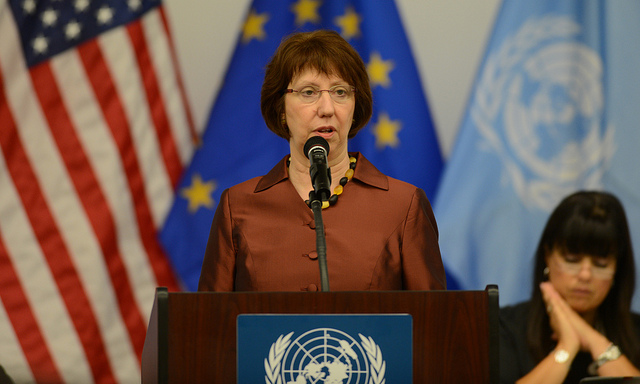
Catherine Ashton addresses the Water, Peace, and Security conference at the United Nations in New York, Tuesday, Sept. 27, 2012 © European External Action Service (EEAS)
Pro-democracy and human rights movements beyond the EU borders will have a new access to grants from a budget of the newly established European Endowment for Democracy (EED). However, even though The Board of Governors of the EED held its meeting in Brussels on 9 January 2013, which also marks its official launch, the future performance of the EED still remains foggy.
Nevertheless, one question is finally clear and that is who is going to take the lead of the new institution. The EED Board of Governors named Jerzy Pomianowski, a career diplomat and the current Polish Undersecretary Ministry of Foreign Affairs, as the Endowment’s Executive Director. This appointment is far from being a surprise, though. Especially as the whole initiative to establish the “Euro-version” of the National Endowment for Democracy (NED), has been primarily Poland’s flagship initiative.
Besides Catherine Ashton, High Representative for Foreign Affairs and Security Policy/Vice-President of the Commission, the 9 January board meeting was joined also by MEP Elmar Brok, chair of the European Parliament’s Foreign Affairs Committee and by Štefan Füle,Commissioner for Enlargement and European Neighbourhood Policy.
It is worth to have a look at the opening speech by Catherine Ashton and the following participants. Catherine Ashton opened the floor with the following words: “The central idea that motivated the creation of the Endowment is Europe’s commitment to advancing democracy. Not only does this benefit the people who aspire to freedom and who champion democratic transitions worldwide; it is also in our own European interest. The Endowment comes at a very timely moment, as 2013 will be a crucial year for democratic transitions, in particular in the EU’s neighbourhood. The European Endowment for Democracy can play a very important role. By working directly with those in the field, who are striving for democracy; and by offering flexible, non-bureaucratic and dedicated procedures that are tailored to the needs and demands on the ground.” [1]
Štefan Füle continued by stating: “I am delighted to see the European Endowment for Democracy becoming a reality. I see the Endowment for Democracy as a strengthened effort, supporting democratisation and peaceful forces that work for democratic changes to happen, supporting the actors of change in our neighbourhood, the emerging players that face obstacles in accessing European Union funding. With this new initiative we are sending a clear message of solidarity to the peoples of the Neighbourhood, assuring them that their democratic aspirations and their fight for human rights will be heard and supported by the European Union. The European Union can also bring its experience and know how to help them address the challenges of transition from authoritarianism to democracy.” [2]
In spite of that, the question of financial backing of the whole project is still unclear, even after 6 months from a point, when the whole project has been announced. Besides € 6.2 million allocated by the Commission from the budget of the European Neighbourhood Policy, both Polish and Swedish governments agreed on providing another € 5 million each. The same is expected from The Netherlands. Switzerland has also generously given with a handful of other EU Member States an additional € 8 million. According to Polish newspaper Gazeta Wyborcza another € 10 million will most likely flow from the Commission over the next three years. [3] All in all, the financial side of the whole project still raises question, whether the rather small amount of money for the kick off – compared to the NED in the United States, which operates with more than 4 times higher budget – will be enough to support all activities the EU aims to in the following years.
As was already mentioned in the previous article, there are many doubts how exactly will the EED look like in the future. The biggest challenge, obviously, besides the financial side of the whole project, is on what actors beyond the EU it aims to focus. The same goes to how flexibly and swiftly the EED is going to be able to support non-institutionalized actors in the already highly unstable and unpredictable areas beyond the EU’s borders. Needless to say, that half-hearted efforts without adequate backing by all 27 Member States – with Croatia to become the 28th Member State on 1 July 2013 – could lead not only to a lack of legitimacy for the EED, but for the EU’s human rights a and democracy promotion efforts beyond its borders as such. Hence, let’s see how Jerzy Pomianowski is going to handle these challenges in his new office.
[1] European Endowment for Democracy – additional support for democratic change, Press Release, Brussels, 9 January 2013, A 5/13, available at http://www.consilium.europa.eu/uedocs/cms_data/docs/pressdata/EN/foraff/134628.pdf
[2] ibid.
[3] EU launches new fund to help oppressed, Euobserver, 10 January 2013, available at http://euobserver.com/enlargement/118684